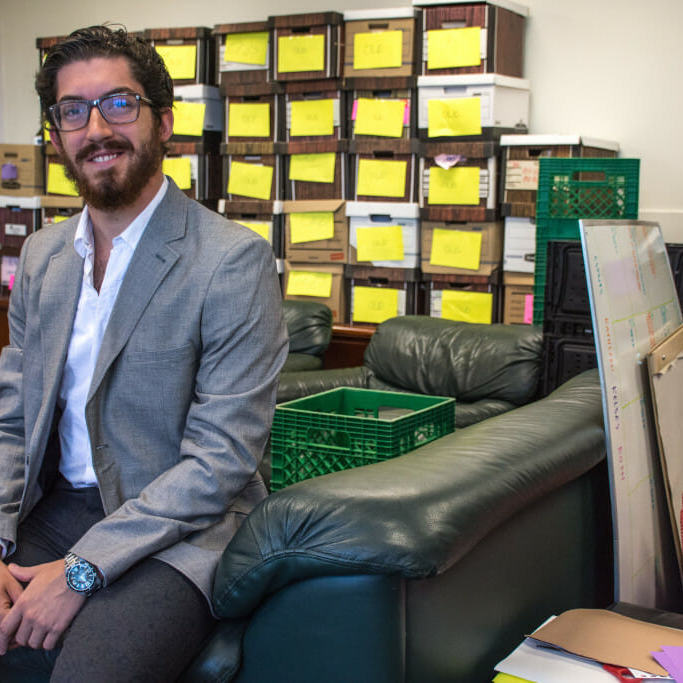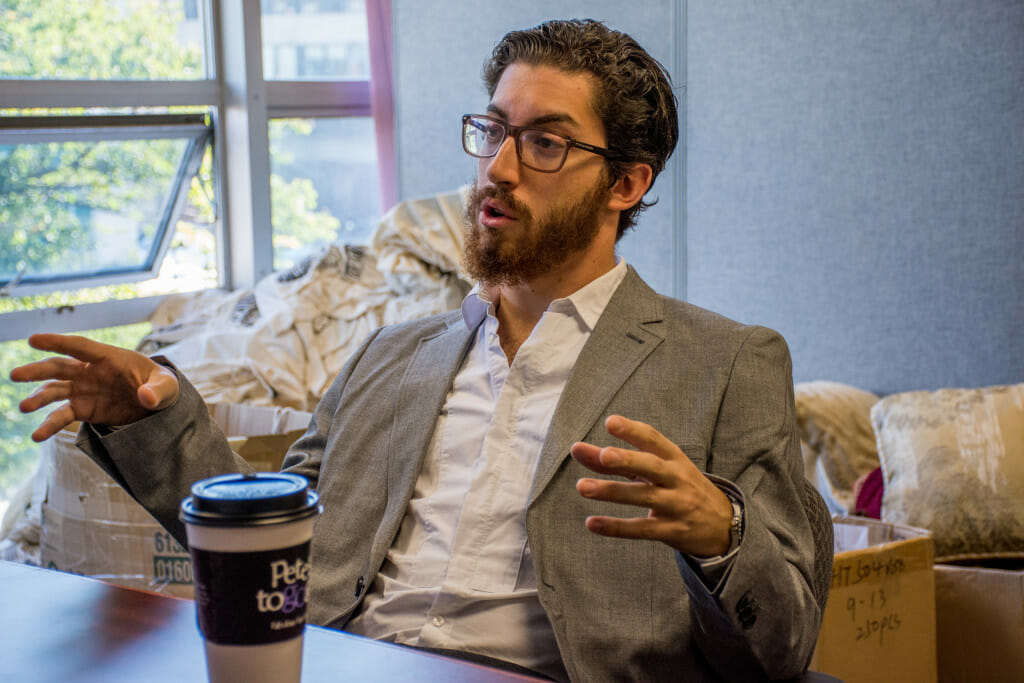
Catching up with your Student Union president
Dan Nicholson chats with the Gazette about recent changes within the DSU and his plans for the year.
Gazette: You said when you were running for president that one of your main reasons for running was “not personally knowing what the union was up to or what they were doing in terms of student outreach.” How have you been changing that so far?
Nicholson: There are a few things that I’m really excited about. One of the programs that I’ve brought in here now for the first time is something called “Text the President.” It’s a dedicated number that I’ve distributed to all first year students. Folks have been texting in with comments, questions, if they have any concerns about what’s going on with the union. I’ve already received texts! By the first or second day that this number went out I had already received three or four texts from different students. One of my favourites, someone texted and said, “hey I’m having a really hard time in residence trying to lower my bed.” It was funny because that resonated with me, because I had the exact same problem when I was in residence. Although that’s outside of the domain of the student union building, I guess that’s not really outside of the domain of student life. I texted this person back and gave him a few tips and tricks that I had used, and the problem is resolved.
We also have our street team up and running, and this year it has been very active. We have a big tabling schedule set up and we’re hitting peak hours, so we have members out and about whether we’re poster-ing or outside flyer-ing, really pushing the Skills Conference, pushing things like the Sexual Assault Phone Line. So we’re really out and about and on the ground. We’re realy working on getting out there and being more visible: on talking to students as opposed to just relying solely on social media or anything like that.
“There’s this weird notion that there are the executives and there are the other students, and we’re trying to break that down.”
We’re also working with the Loaded Ladle. I was down there last week for about an hour, just serving food to students. We had ABBA playing in the background, all the servers were dancing and singing, there was probably a lineup of 200-300 students looking for that serving of food for the day. And every single student who I was able to put food on a plate for had a huge smile and you could tell that folks were very grateful and thankful for being able to have that hot meal that’s free. So what we want to do is get all five executives down there serving up food. A student comes through and they’re face to face with servers for about 30 seconds while their plate goes down the line, and that’s such an excellent opportunity for individual contact and individual outreach. We want to take advantage of that and say “Yeah, we’re real students. We are here on the ground. We are experiencing the same trials and tribulations as other students, right?” There’s this weird notion that there are the executives and there are the other students, and we’re trying to break that down.

(Photo by Patrick Fulgencio)
G: Have you seen a positive student reaction to all of these new outreach opportunities?
N: I would say absolutely. One example is Orientation Week this year, where our biggest problem was that each of our events was hitting max capacity, which is a great problem to have! And even things like the Society Expo, where we had about 5,000-6,000 students. We had a table there serving sno-cones and again, students would be there for maybe 30 seconds while I was serving them sno-cones and it was a perfect time to be able to have a conversation with students and just do outreach. That’s the biggest thing. In terms of positive reaction, I would say you can see it with even just those two events, having such high numbers or high volumes of engaged students coming out. We’re over the moon about having such an incredible constituency of students who are seemingly engaged and just happy to be here.
G: You mentioned last year that you really wanted to make sure that all the executives were aligned, that everybody had the same goals. How has that been going so far?
N: I would say more than fantastic. It’s already been more than five months, so our term is almost half over, which is really scary to think about. I don’t think that we could have asked for a better group. Not only do we work together but we also, outside of work, spend time together. We all get together a few times a week and do things like playing intramurals together or going out after work to get some food. It’s the little things outside of the workplace that ensure that we mesh well together, I suppose. The biggest thing that we do to ensure that everyone is on the same page and working towards common goals is constant and frequent check-ins. Being able to check in with these folks and asking “how are you feeling about this?” or “can I support you in any way here?” I think that the fact that all of us are lending that same level of support to each other has propelled us through some of the best of times and some of the worst of times.
G: About this “best of times, worst of times.” What are you happiest about since you’ve started?
N: I guess I’m happiest about the way we’ve just been able to stay together as a coherent, efficient team. We trust each other enough to make individual decisions about certain things, but we also trust each other enough and know each other enough to know when it’s important to check in. A lot of times we’re all bouncing ideas off of each other and looking for “what would you do in this situation?” or “how can I do this?” I think I’m most impressed with that, and how we’ve developed over the past five months as this single, functioning, efficient unit. That’s been the most incredible thing for me: the way that we all interact with each other’s various initiatives. Whether it’s the sexual assault and harassment phone line, all the executives got behind that, or the skills conference, which all the executives also got behind. It’s the same thing with the (society) expo and Orientation Week. Everyone is just so involved with everyone else’s issues. It makes for the best work place that you could ask for.
G: And what has the biggest challenge been so far?
N: There have been a few. We definitely had to face various struggles or hurdles, especially with many of the recent events that have happened on campus. It was a very sombre time. And that’s what you could feel in the office.
“What we try and do here is ensure that it is a very safe and very inclusive space that is free of judgment and is free of any negativity.”
But we do have that kind of support network, which was a really big deal for us. If one executive was coming in that day and having a very difficult time with some of the events that had taken place, that was totally ok. I think we were able to support each other in a way that ensured that all of our folks, so they knew that it was ok if I had to, say, take a day or take a couple days or if I was in a meeting and had to step out and catch my breath. What we try and do here is ensure that it is a very safe and very inclusive space that is free of judgment and is free of any negativity. It just makes it that much easier for everyone to work through together.
G: With the executive all working so closely together now, what is the biggest thing that you are all working towards?
N: One of the biggest goals would be the federal election that is going on in October. But we do have many biggest goals, and I don’t know if I can say “the biggest goal that we all have” since we all have very big goals that we all get behind. One of those, which we’re focusing on right now, is trying to get as many students to vote as possible. The coolest thing about that is the level of engagement that we’ve seen. The majority of folks that we’ve talked to, that we approach, that we engage with, they’re all very excited. And I don’t think it was like that before. That’s something that I’m really proud of. John (Hutton, Vice President Academic & External) has been essentially spearheading our “get out the vote” campaign, and I’m really proud of the work that he’s done and the fact that we can all come together and help him out, it’s been fantastic. I think that another main focus is probably the sexual assault and harassment phone line. That’s been running since the beginning of orientation week, and something we think is crucial and essential to student life is having that offer out there.
G: Is there anything else that you would like to add?
N: Just that, on our end, we’re trying very hard to ensure that there are options for students and that folks know, one, who we are, and two, what we can do for them. We’re never going to operate from a perfect system, we’re never going to reach all students … I feel like that would be the Holy Grail, to reach to all students through one system. But I think the biggest thing that I would want folks to know is that we are trying very hard, and that if they see us out and about on campus then they shouldn’t be afraid to approach us, they should come and chat.
This interview has been edited for brevity and clarity.






